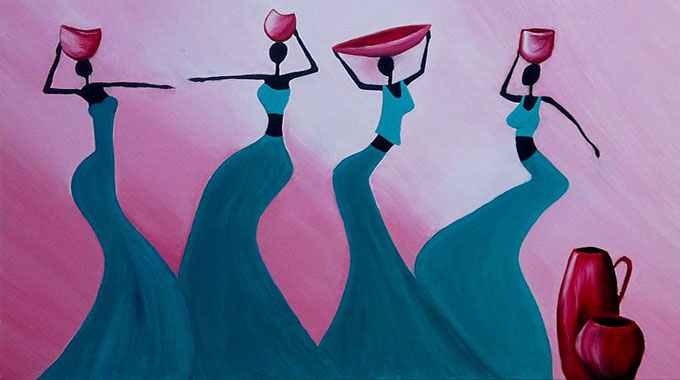
The Sunday News

Tafadzwa Gwetai
ART and history have always been intertwined. Literature has been written, movies/ films have been made and historical facts prove that art has been a hidden but crucial contributor to countries cultural fibre. Novels and movies/ film, both fiction and fact have been created to highlight the importance of art to their counties.
Elaborate robberies have been staged with the aim to ‘‘liberate’’ art from its captors. “Liberate” as if to free someone or people from imprisonment or form of slavery. Art is given a living quality. A quality that makes one curious about why these efforts to “liberate” art and why and the how art has been in the background ethnic humanist ideals. Art as a symbol of values, thoughts and beliefs.
The desire to want to acquire an art piece has more than monetary and aesthetic value. Creations by masters from the past have a heritage and much deeper connection to the contemporary man.
The artist can be described as being a documenter and social reflector of community, its thoughts and states of mind. The level and depth of passion we are presented with through novels and movies about a passionate attempt at acquiring a painting or sculptural work of art back to its country of origin should inspire Africans.
We are who we are and that is a “lost” generation as most of our identity was destabilised by the greedy acquisition of African artefacts throughout Africa. This was a strategic colonial agenda by the west to use art creations as a form of disorienting the Africans state of mind.
African art was looted and taken from home like our forefathers and displaced to distant lands where they find no purpose. Africa’s most prized treasures are in storage across Europe such as France, Germany, United Kingdom and Italy. The artefacts possess great meaning and power to the African community and have very strong ties to their story of origin. The arrival of the Europeans in the fifteenth century had a profound and significant effect on the African’s life and African art.
Every community has a number of “spirits” that are believed to have control over natural phenomena and people’s way of thoughts and beliefs. These were represented through symbols in the form of sculptures and paintings.
The colonialists domineering approach extended to wanting to dominate African art. The Europeans used a psychological approach to convince the African that their creations were pagan.
Art in Africa was colonised to suit the colonialist and this posed a problem for the accurate study of African art. African art no longer possessed its true essence of the of the original meaning due to colonial and the artistic hegemony of the Europeans.
As a result African art was not given the status of respect among other art works due to the Europeans’ failure to accurately translate and fully comprehend the true absolute meaning of African artistic creations.
Repatriation is the return of art or cultural heritage, usually referring to ancient or looted art, to their country of origin or former owners (or their heirs). The disputed cultural property items are physical artefacts of a group or society that were taken from another group usually in an act of looting, whether in the context of imperialism, colonialism or war.
The contested objects range widely from sculptures and paintings to monuments and human remains. Our heritage is locked up behind glass enclosures far from home. Our past and true stories of our ancient people are in museum shelves beyond our reach.
Modern day agreements suggest that the artefacts that were uprooted from Africa and transplanted in Europe need to be returned so as to finally close the chapter of the colonial agenda.
The legitimacy upon which the creations were acquired is questionable. Africa is literally begging for the return of her artefacts and restore cultural imbalances. The argument from the west is that we ‘‘will’’ fail to maintain our own artefacts due to inadequate facilities, corruption and lack of curatorial skill.
Europe holds the world’s most prised ancient artefacts as the creations possess a potent power that links a people with their authentic past. Artefacts from indigenous people such as the Aborigine from Australia, Asia, south America, India, Arabia and modern day Mexico are all kept in museums, distanced from their people.
The value of art goes beyond simple economic value. Art can be educational, life-enhancing and help to define our personal and national identities. The absence of historical art creates an emptiness in the history and heritage of many African countries, and we believe impacts personal motivation, creativity and innovation. African art has come a long way and is finally being created, studied and documented for us and by us.
Zimbabwe should be proud as our local artists are now more visible and their voice and stories are being told without reservation. However our art and artists are still being slowly lured and collected by the West.
As a protest I would like to see our African creations relate and be collected by Africans so as to find pride our own being. If we cannot retrieve our stolen artefacts we would rather hold on to what we have and accurately document our creations with Africa in mind.
We are privileged to be living in an era where Africa has strong emergence of African curators, African art collectors and international standard art galleries and museums.
However, the repatriation of African artefacts to Africa would enable accurate study and an understanding that has depth and relevance to the indigenous community.
Europe generates millions of Euros primarily from tourism generated from visitations to their museums to view our heritage locked behind glass cabinets and speechless. Their voices cannot be heard and the songs that used to be sung in their praise can no longer be sung. Liberate African art.
Remember, ‘‘Legalise Art’’, promote, permit, admit, validate, legitimise, decriminalise, authorise, permit.
Feedback: mailto:[email protected]/[email protected]



